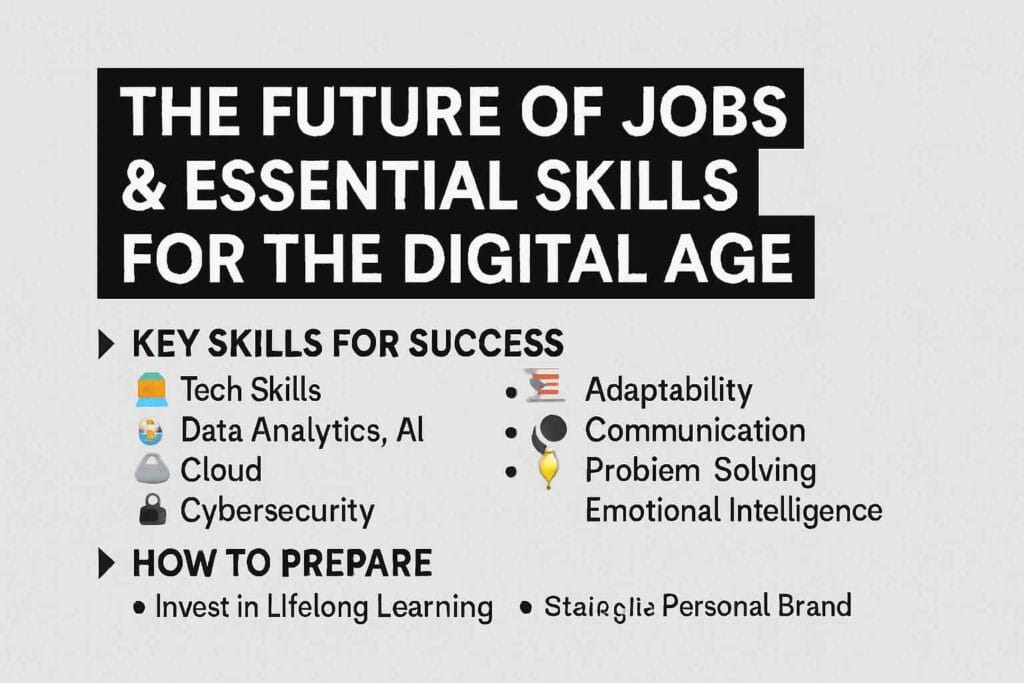The Future of Jobs and Essential Skills for the Digital Age: How Can We Prepare for Jobs of the Future?

In today’s rapidly evolving world, the job market is changing at an unprecedented rate. The digital age has introduced a variety of new opportunities while also reshaping traditional industries. To thrive in this digital era, it is essential for individuals to stay adaptable and continuously update their skill sets. In this article, we will explore the future of jobs, the skills that will be in high demand, and how you can prepare for the jobs of tomorrow.
The Shift Towards Digital
The digital transformation is impacting almost every aspect of the modern workforce. From artificial intelligence (AI) to automation, and from blockchain to cloud computing, technologies are transforming how businesses operate and how employees perform their tasks. As a result, many jobs are being automated, while new roles and industries are emerging. In particular, industries such as technology, healthcare, finance, and even education are experiencing significant shifts due to digital innovations.
Key Skills for the Future Workforce
To remain competitive in the job market, it is crucial to acquire certain skills that are expected to be in high demand. These skills can be broadly categorized into technical (hard) skills and interpersonal (soft) skills.
1. Technical Skills (Hard Skills)
- Programming and Coding: As technology becomes more ingrained in every aspect of life, coding and programming skills are becoming increasingly essential. Languages such as Python, JavaScript, and SQL are already widely used in various industries. Mastery of programming will not only open doors in software development but also in fields like data analysis, artificial intelligence, and cybersecurity.
- Data Analytics and Artificial Intelligence (AI): The ability to analyze data and extract meaningful insights is crucial. With the rise of big data, businesses need professionals who can navigate data sets and use AI and machine learning tools to make data-driven decisions.
- Cloud Computing: The demand for cloud computing professionals has skyrocketed. As companies move their infrastructure to the cloud, experts in platforms like AWS, Microsoft Azure, and Google Cloud are sought after to manage and optimize these systems.
- Cybersecurity: With the increasing prevalence of cyberattacks and data breaches, cybersecurity is more important than ever. Understanding how to protect sensitive information and networks is a critical skill for any industry.
- Blockchain: Although initially associated with cryptocurrencies, blockchain technology has a wide range of applications. Professionals with knowledge of blockchain technology are in demand for roles in finance, logistics, healthcare, and more.
2. Interpersonal Skills (Soft Skills)
While technical proficiency is essential, soft skills are just as important for success in the future workforce. These skills help individuals collaborate effectively, solve problems, and adapt to changing circumstances.
- Adaptability and Continuous Learning: As the job market evolves, the ability to learn and adapt is crucial. Professionals who are open to change and continuously upgrade their skills will be better positioned to take on new challenges.
- Communication and Collaboration: With the rise of remote work and global teams, effective communication has become a cornerstone of successful projects. The ability to convey ideas clearly, listen actively, and collaborate across time zones and cultures is essential.
- Problem-Solving and Critical Thinking: As AI and automation take over routine tasks, human workers will be required to focus on complex problem-solving and creative thinking. Developing these skills will help individuals take on roles that require strategic thinking and innovative solutions.
- Emotional Intelligence: Emotional intelligence (EQ) refers to the ability to recognize, understand, and manage our own emotions as well as the emotions of others. In a digital world, emotional intelligence is crucial for leadership, teamwork, and conflict resolution.
Preparing for the Jobs of the Future
As the future of work becomes increasingly digital, the key to success lies in preparing for the evolving job landscape. Here are a few practical steps to ensure you’re ready for the future:
1. Invest in Lifelong Learning
The pace of technological change means that the skills needed today may not be relevant in the future. To stay ahead, it’s important to embrace continuous learning. This can be through formal education, online courses, certifications, or self-study. Platforms like Coursera, Udemy, and LinkedIn Learning offer a wealth of resources to help you learn new skills.
2. Pursue Cross-Disciplinary Knowledge
The future workforce will require individuals who can integrate skills from multiple fields. For example, combining knowledge of data science with business strategy or merging coding skills with digital marketing can create a unique and valuable skill set.
3. Build a Personal Brand
In a digital world, your online presence matters. Building a personal brand on platforms like LinkedIn or GitHub can help you showcase your skills, projects, and expertise. Networking online and participating in relevant communities can open doors to new career opportunities.
4. Get Hands-On Experience
Theory is important, but hands-on experience is equally crucial. Internships, freelance work, or personal projects can give you real-world experience and help you build a portfolio of work to demonstrate your abilities to future employers.
5. Stay Agile and Open-Minded
The future job market will require individuals who are flexible and open to new experiences. The willingness to pivot into new roles or industries, if necessary, will allow you to stay relevant and resilient in the face of change.
Conclusion
The future of work in the digital age is both exciting and challenging. By acquiring a mix of technical and interpersonal skills, and staying committed to lifelong learning, individuals can thrive in the evolving job market. Preparing for the jobs of tomorrow requires a forward-thinking mindset, adaptability, and the continuous development of both hard and soft skills. The key to success lies not in predicting the future, but in being prepared to embrace it.
Source : Medium.com




